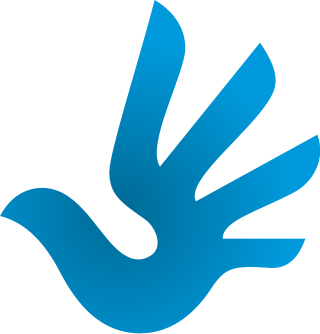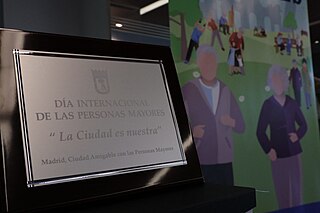
The United Nations (UN) is a diplomatic and political international organization with the intended purpose of maintaining international peace and security, developing friendly relations among nations, achieving international cooperation, and serving as a center for coordinating the actions of member nations. It is widely recognised as the world's largest international organization. The UN is headquartered in New York City, in international territory with certain privileges extraterritorial to the United States, and the UN has other offices in Geneva, Nairobi, Vienna, and The Hague, where the International Court of Justice is headquartered at the Peace Palace.

The United Nations Economic and Social Council (ECOSOC) is one of the six principal organs of the United Nations, responsible for coordinating the economic and social fields of the organization, specifically in regards to the fifteen specialized agencies, the eight functional commissions, and the five regional commissions under its jurisdiction.

The World Evangelical Alliance (WEA) is an interdenominational organization of evangelical Christian churches with 600 million adherents that was founded in 1846 in London, England, to unite evangelicals worldwide. WEA is the largest international organization of evangelical churches. It has offices at the United Nations in New York City, Geneva, and Bonn. It brings together nine regional and 143 national evangelical alliances of churches, and over one hundred member organizations. Moreover, a number of international evangelical denominations are members of the WEA. As of March 2021, the Secretary General of the WEA is German theologian Thomas Schirrmacher.

The United Nations Human Rights Council (UNHRC) is a United Nations body whose mission is to promote and protect human rights around the world. The Council has 47 members elected for staggered three-year terms on a regional group basis. The headquarters of the Council are at the United Nations Office at Geneva in Switzerland.

Human Rights Day (HRD) is celebrated annually around the world on 10 December every year.

The International Day of Peace, also officially known as World Peace Day, is a United Nations-sanctioned holiday observed annually on 21 September. It is dedicated to world peace, and specifically the absence of war and violence, such as might be occasioned by a temporary ceasefire in a combat zone for humanitarian aid access. The day was first established in 1981 and first observed in September 1982 and is kept by many nations, political groups, military groups, and people.
The United Nations Human Settlements Programme (UN-Habitat) is the United Nations programme for human settlements and sustainable urban development. It was established in 1977 as an outcome of the first United Nations Conference on Human Settlements and Sustainable Urban Development held in Vancouver, Canada, in 1976. UN-Habitat maintains its headquarters at the United Nations Office at Nairobi, Kenya. It is mandated by the United Nations General Assembly to promote socially and environmentally sustainable towns and cities with the goal of providing adequate shelter for all. It is a member of the United Nations Development Group. The mandate of UN-Habitat derives from the Habitat Agenda, adopted by the United Nations Conference on Human Settlements in Istanbul, Turkey, in 1996. The twin goals of the Habitat Agenda are adequate shelter for all and the development of sustainable human settlements in an urbanizing world.

The International Holocaust Remembrance Day, or the International Day in Memory of the Victims of the Holocaust, is an international memorial day on 27 January that commemorates the victims of the Holocaust, which resulted in the genocide of one third of the Jewish people, along with countless members of other minorities by Nazi Germany between 1933 and 1945, an attempt to implement its "final solution" to the Jewish question. 27 January was chosen to commemorate the date when the Auschwitz concentration camp was liberated by the Red Army in 1945.

France has been a member of the United Nations (UN) since its foundation in 1945 and is one of the five countries, alongside China, Russia, the United Kingdom, and the United States, that holds a permanent seat on the United Nations Security Council (UNSC), which is responsible for maintaining international peace and security.

The Convention on the Rights of Persons with Disabilities is an international human rights treaty of the United Nations intended to protect the rights and dignity of persons with disabilities. Parties to the convention are required to promote, protect, and ensure the full enjoyment of human rights by persons with disabilities and ensure that persons with disabilities enjoy full equality under the law. The Convention serves as a major catalyst in the global disability rights movement enabling a shift from viewing persons with disabilities as objects of charity, medical treatment and social protection towards viewing them as full and equal members of society, with human rights. The convention was the first U.N. human rights treaty of the twenty-first century.

The International Day of Older People is observed on October 1 each year.
A sighted child who is reading at a basic level should be able to understand common words and answer simple questions about the information presented. They should also have enough fluency to get through the material in a timely manner. Over the course of a child's education, these foundations are built on to teach higher levels of math, science, and comprehension skills. Children who are blind not only have the education disadvantage of not being able to see: they also miss out on the very fundamental parts of early and advanced education if not provided with the necessary tools.

World Autism Awareness Day is an internationally recognized day annually on 2 April, encouraging Member States of the United Nations to take measures to raise awareness about autistic individuals throughout the world. It was designated by the United Nations General Assembly resolution (A/RES/62/139), passed in council on 1 November 2007, and adopted on 18 December 2007. It was proposed by Moza bint Nasser Al-Missned, the United Nations Representative from Qatar, and supported by all member states.
The official languages of the United Nations are the six languages used in United Nations (UN) meetings and in which the UN writes all its official documents.

United Nations General Assembly Resolution 68/262 was adopted on 27 March 2014 by the sixty-eighth session of the United Nations General Assembly in response to the Russian annexation of Crimea and entitled "territorial integrity of Ukraine". The nonbinding resolution, which was supported by 100 United Nations member states, affirmed the General Assembly's commitment to the territorial integrity of Ukraine within its internationally recognized borders and underscored the invalidity of the 2014 Crimean referendum. Eleven nations voted against the resolution, while 58 abstained, and a further 24 states were absent when the vote took place.

Tiffany Brar is an Indian community service worker who became blind as an infant due to oxygen toxicity. Brar is the founder of the Jyothirgamaya Foundation, a non-profit organization that teaches life skills to blind people of all ages. She is a trainer, a campaigner for disability awareness and an advocate for an inclusive society.
Bengt Olof Lennart Lindqvist was a Swedish politician and advocate of persons with disabilities.
International Day of Education is an annual international observance day held on January 24 and is dedicated to education. On December 3, 2018, the United Nations General Assembly adopted a resolution proclaiming January 24 as International Day of Education, in celebration of the role of education for bringing global peace and sustainable development.
The following lists events that happened with or in collaboration with the United Nations and its agencies in the year 2020.

The right to a healthy environment or the right to a sustainable and healthy environment is a human right advocated by human rights organizations and environmental organizations to protect the ecological systems that provide human health. The right was acknowledged by the United Nations Human Rights Council during its 48th session in October 2021 in HRC/RES/48/13 and subsequently by the United Nations General Assembly on July 28, 2022 in A/RES/76/300. The right is often the basis for human rights defense by environmental defenders, such as land defenders, water protectors and indigenous rights activists.














